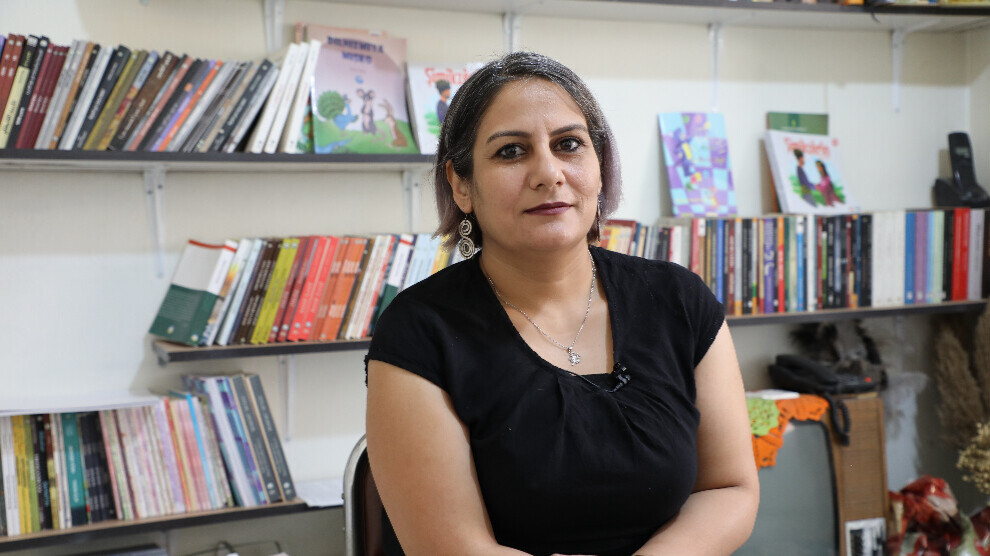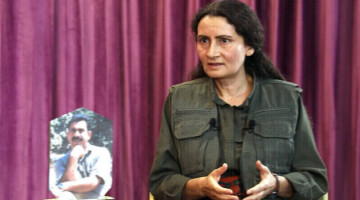Nerîman Evdikê, spokesperson of the Northern and Eastern Syria Literature Council, said that they have not yet been able to fully express and reflect the revolution through literature, and that there are still no books that truly reflect the revolution, but said that it is too early.
Nerîman Evdikê spoke to ANF about literary work, the difficulties experienced, and Kurdish literature developed with the revolution. Evdikê said that when evaluating literary work in Northern and Eastern Syria, these cannot be considered in isolation from the pre-revolutionary period, and added: "Literary work or Kurdish literature did not develop only with the revolution. All today's work was developed based on the legacy left behind. Before the revolution, we had writers and poets. They made great efforts. They had to struggle with many difficulties. Their efforts and struggles over the years have provided us with a significant basis today."
The responsibility of the Literature Council is great
Nerîman Evdikê noted that conditions have changed with the Rojava Revolution, opportunities have been created, many achievements have been made, and a certain stability has been achieved in literary work. She said: "Many of our writers and intellectuals who worked before the revolution are not accustomed to these opportunities, and even for most of them, the opportunities created today seem like a dream. Of course, there are difficulties in using these opportunities. As I said, there is an infrastructure, there are a significant number of writers, researchers and poets, and a new generation emerged after the revolution. This new generation is also very talented and knowledgeable. The important thing is that we bring all of them together and make more beautiful things emerge. In fact, the responsibility for this falls largely on the Literary Council. We have printing houses, we have magazines. Literature festivals are organized. Kurdish books can now be distributed easily. We can send our books to book fairs held abroad. Of course, all these are important and valuable developments for us."
We face shortcomings
Nerîman Evdikê stated that there was a lack of better evaluation of the opportunities that developed with the revolution and that they encountered their shortcomings and said: "Contradictions between old and young writers make it difficult to establish the balance between the old and the new. Now there is a literature developing with the new generation, there are many changes in both the types and forms of written products and their content. A great revolution has taken place, there are opportunities created by the revolution, there are changes in different dimensions. Therefore, there is a lot of difference between a product an author wrote today and a product he wrote 20 years ago. The author is the same person, the technique and idea he uses are the same, but there is a revolution happening here, and this revolution will definitely affect that work. The impact of the revolution will be reflected in all products, from poetry to novels, stories, articles. In this sense, we cannot say that there is no revolutionary literature in Rojava, but we still face some shortcomings.
There is no product that really reflects the revolution
We are experiencing something very big and sacred. Perhaps we have a revolutionary reality that is rare in history. We are very lacking in expressing and reflecting this revolution through literature. A product that truly reflects the revolution has still not been produced. Or, to better put it, we are still far from products that really reflect the revolution and its achievements."
The revolution will bring out the young and true literature
Evdikê continued: "The revolution is still young and there should be no rush. The real literature of this revolution will emerge in the future. The values created by this revolution will be processed for another 50 years. We experience the revolution on a daily basis. There are attacks on the revolution every day, great suffering is experienced. Of course, I think that time is needed to reflect this as it is, with the spirit and psychology in which it lives. I believe that greater efforts and sacrifices must be made to do justice to every epic and heroism experienced in the revolution. In this sense, I think it is too early to ask whether literature is the answer to the revolution."
Old people do not read new books
Stating that old and experienced writers and literary figures are in a prejudiced and reproachful position toward the new generation, Nerîman Evdikê added: "One of our main problems is that the old people do not read the books of the new generation. They both do not read and criticize heavily. There is an old generation that constantly reproaches, criticizes and dislikes young writers. On the other hand, there is a generation that grew up in the revolution, lived with the revolution and grew up with Kurdish. In the past, when we read an author's work of a few sentences written in Kurdish, it seemed very different to us, and it was seen as a great success for us. Today, our young people write books in Kurdish very easily. There is no language problem for them, no problem with publishing and distributing their own works. This being the case, the new generation does not think about the problems, difficulties and obstacles. Young writers just adapt to what they write. This allows them to give the idea or message they want.
There is a serious disconnection between the older and the younger generations. Young people do not benefit from the experiences of the older generation, and the old generation does not support young people, and does not want to help them by being their teachers. This situation causes the problem to grow even further. Those who read the books released today in the future will be able to see the huge gap more easily. These two generations need to come together. It is necessary to bring them together in joint events and try to ensure that both parties read or present their own works. That's why we organize such events from time to time. Often, older writers are surprised by the work of younger writers. Since our old writers and literary figures do not read the books of the new generation. In fact, they should have guided us. Yet, since none of them have an opinion on the products published so far, if there is a serious deficiency in the works published, it remains so."















